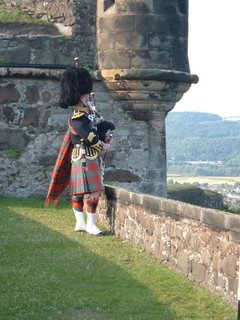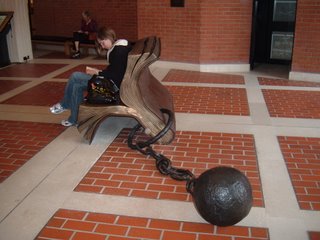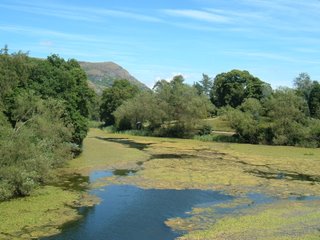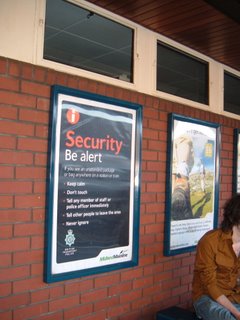
For two weeks, my primary interest in stabbing other people has taken second place to the demands of work. I missed an evening’s fencing and, had it not been for the delights of Scottish country dancing, my aggression would have reached danger levels. A colour-coded warning system might help – it could shine red if I reach for the butter knife.

My first journey was a day trip to London. The little bit I saw was its usual messy self. Perhaps a few more police were evident after the 7/7 anniversary, but not enough to spread alarm. Some security measures were primitive – but I’ve been used to bomb alerts since the 1970s. Notices urging vigilance remind me of my youth.

Last Wednesday I should have fenced, but I’d headed north to an international gathering. Work and wine werethe twin themes. Cheese and wine were served daily at 4.00 p.m. –perhaps an old Scottish custom with which I was unfamiliar. By the end of my stay, I’d developed a perverse craving for Earl Grey and cucumber sandwiches. Bottles of wine stood neglected amid general enthusiasm for water and orange juice. Had some Temperance League urged us to take the pledge, we might have begged to sign.
The wine wasn’t needed for the general bonhommie. Few of us had met before, but friendships commenced even before much alcohol was consumed. We looked out on the castle, across the hills, over the gleam of the loch - and found we had much in common.

Regardless of native language or country, we heard the news with horror and mistrusted our rulers. Our gentle alliances contrasted with the newly smashed lives in the Middle East. Word of bombings and atrocities trickled in during short gaps between formal and social sessions.
As a British traveller, I usually avoid the kind of events laid on for tourists but in this setting I realised their value. At the castle we were piped into dinner and after our meal we were expected to dance. Age has become an advantage. Now I’m past 50, no-one expects elegant dancing and I’ve stopped worrying about inviting people to partner me. As the ceilidh band’s caller showed delicate caution and the waiters concealed mirth in unfeasible solemnity, I indulged happily in the Gay Gordons, the Dashing White Sergeant, Circassian Circle and Eightsome Reel. Only the waltz saw me sitting out – some dances are meant for lovers and partners.

So we worried about the world, talked, danced and formed friendships. Amid fortresses and battlefields of the past, we found common ground in a brief escape. We talked about poetry and politics, and dreamt of a world as harmonious as the landscape.
By the end of four days alcohol and exhaustion were taking their toll.
We didn't quarrel - there still were instances of complete agreement - but conversation was just a little more of an effort. The hills looked attractively lonely and I began to dream of islands and the sea.

There was a last burst of drinking and dancing and we dispersed. The real world had been waiting for us all the time.
I'll be stabbing people again tonight.







